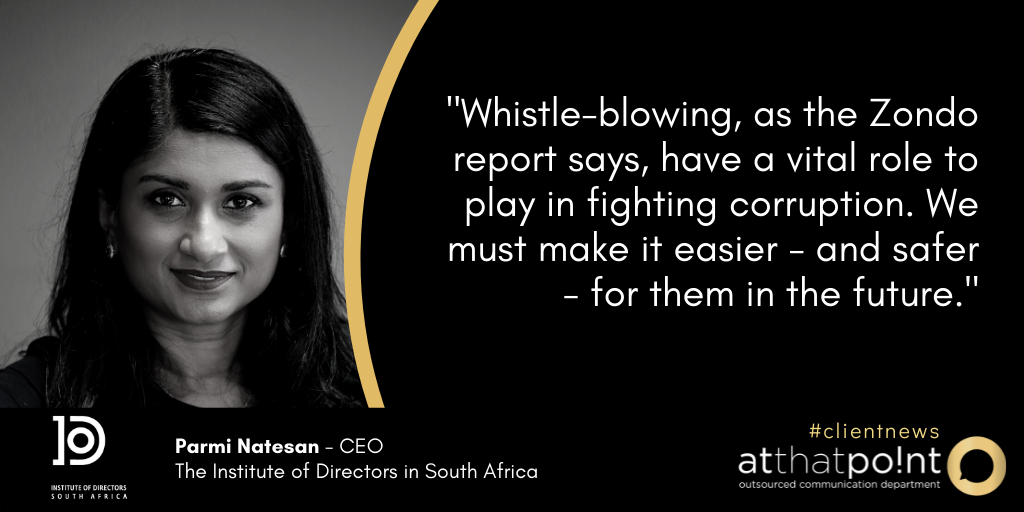|
In view of their important role in supporting governance, boards must take steps to protect whistle-blowers and promote a culture of whistle-blowing.
By Parmi Natesan, CEO, Institute of Directors in South Africa The Zondo Commission’s first report highlights the key role that courageous individuals play in raising the alarm about corruption in general, and state capture in particular. People like Cynthia Stimpel at South African Airways and Athol Williams at Bain Consulting, it says, are “one of the most effective weapons against corruption.”[1] At the same time, though, the report makes the important point that the whistle-blower must be able to “trust that the disclosure will be treated in strict confidence and that the recipient can offer adequate protection against harm”.[2] The importance of whistle-blowers is also recognised in King IV. In particular, King IV recommends that in its management of ethics the board not only puts mechanisms for reporting ethical breaches in place, but deals with such disclosures “appropriately”.[3] As the report makes clear, this recommendation was simply not implemented various state-owned enterprises with devastating impact on their long-term sustainability, but also on the whistle-blowers themselves. Clearly, boards who take seriously their fiduciary duty to safeguard the long-term interests of their organisations must take heed of these findings and put measures in place to encourage whistle-blowing and also ensure that whistle-blowers themselves are protected from negative consequences. How to do it Cynthia Stimpel believes that creating a safe space in which people feel able to raise difficult questions without being victimised is the vital first step. Of course, creating a corporate culture is never easy or quick—it’s a slow, incremental process, she emphasises. “There are a lot of difficult conversations we need to have in South Africa, and they are just not happening,” she says, adding that personal courage is a prerequisite here. A comprehensive policy is an important building brick, Ms Stimpel says, something that The Ethics Institute’s Liezl Groenewald backs. Ms Groenewald notes that the Protected Disclosures Amendment Act makes it mandatory to have a policy. A policy is not enough on its own. Ms Groenewald says that it must be complemented by a range of channels that whistle-blowers can use. All too often, companies implement a hotline and consider the work done. However, research conducted by the Institute shows that a substantial 42% of South African workers prefer to report ethical violations to their line manager, with 13% opting for HR, 11% for risk management and 11% for another manager. Only 2% use the hotline.[4] Once a complaint is reported, it is vital that action is taken—only then will employees believe that the culture exists. Action, yes, but it must be the right action: the complaint must be investigated by the right individuals, confidentiality must be maintained and then consequences must follow. A key principle is that all complaints must be collated in a central node so that they can be monitored, and proper reports supplied to the board. The loop then needs to be closed by advising the complainant that an investigation has taken place and that action has been taken—the details don’t need to be given, Ms Groenewald adds. Because of their leadership role, Ms Stimpel feels that the CEO and executive team are pivotal. As always, boards have to play an oversight role—they must ensure that they receive the reports and interrogate them deeply. Given that directors are often part of the problem, she believes they should be members of the IoDSA so they can be held accountable. Training is an important piece of the puzzle. Directors can benefit from the programmes created by the IoDSA, but everybody in the organisation needs to know why whistle-blowing is so important as a way to protect the organisation (and thus their jobs), how to identify unethical behaviour and finally how to report it. Finally, protection. Clearly, providing an environment in which these kinds of concerns can be safely raised is part of it, as is scrupulous confidentiality during the reporting/ investigation/ action process. When and if the whistle-blower’s identity becomes known, the company can assist with better home security or a transfer to another office. Whistle-blowing, as the Zondo report says, have a vital role to play in fighting corruption. We must make it easier—and safer—for them in the future. ENDS MEDIA CONTACT: Idéle Prinsloo, [email protected], 084 587 9933, www.atthatpoint.co.za For more information on the IoDSA please visit: Website: www.iodsa.co.za Twitter: @The_IoDSA LinkedIn: Institute of Directors South Africa Company Page Facebook: Institute of Directors South Africa
0 Comments
Leave a Reply. |
Archives
July 2024
Categories
All
|


 RSS Feed
RSS Feed